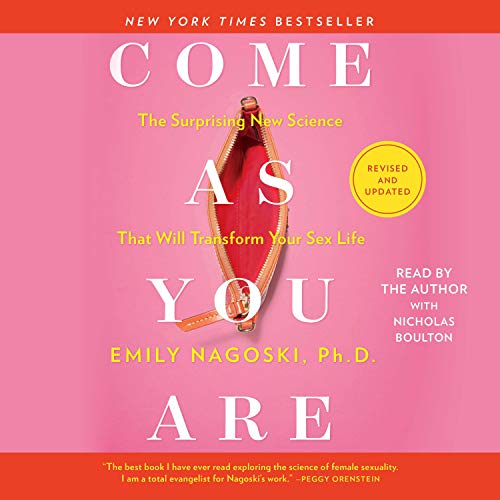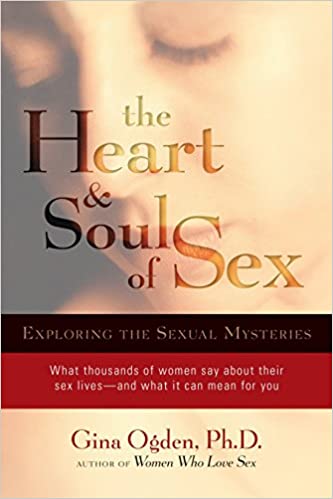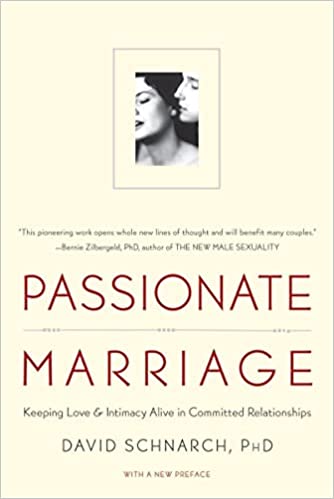After my podcast with Jen Hatmaker last week, I received a message from an Instagram follower inquiring about adult sex education. Although it’s maddening that most of us didn’t receive the sex education we needed, I was taken aback by this group of 30 somethings who are committed to rewrite their sexual stories in community.
Amazing.
The woman asked if I had any recommendations for books or curriculum. I told her I would ask Instagram and you all came through in a major way.
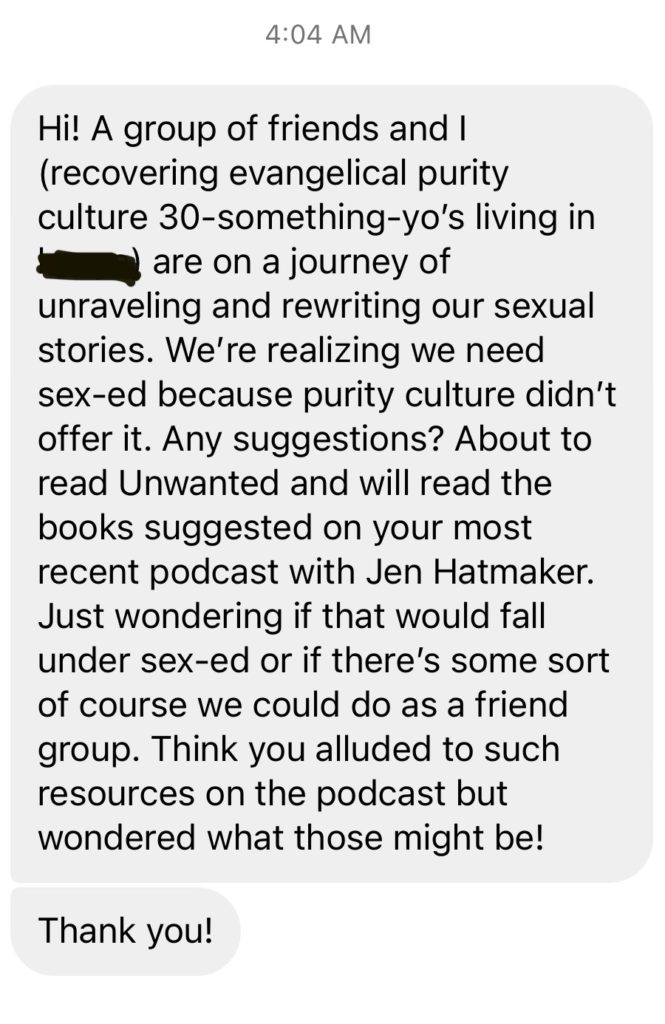
There were too many resources to count, but here are the books, courses, authors, and events that received multiple upvotes.
I am not endorsing these resources, but I wanted to offer resources shared form those in my diverse community. Some lean conservative and some lean progressive. We can all stand to be a bit more curious about where people are on their journey and hopefully, address the light and shadow in the beliefs we hold.
At the end of this post, I will include some thoughts on deconstruction and reconstruction as it relates to a theology of sex.
The Top Two Resources Recommended (By Far!)
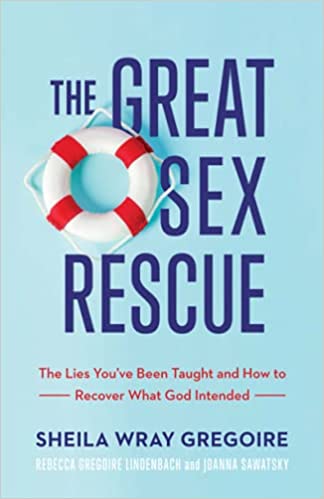
The Great Sex Rescue – Sheila Gregoire
Based on a groundbreaking in-depth survey of 22,000 Christian women, The Great Sex Rescue unlocks the secrets to what makes some marriages red hot while others fizzle out. Generations of women have grown up with messages about sex that make them feel dirty, used, or invisible, while men have been sold such a cheapened version of sex, they don’t know what they’re missing. The Great Sex Rescue hopes to turn all of that around, developing a truly biblical view of sex where mutuality, intimacy, and passion reign.
Come As You Are – Emily Nagoski
Come As You Are is an essential exploration of why and how women’s sexuality works—based on groundbreaking research and brain science—that seeks to radically transform your sex life into one filled with confidence and joy. Nagoski notes the most important factor in creating and sustaining a sex life filled with confidence and joy is not what the parts are or how they’re organized but how you feel about them.
Affiliate links are included to support content like this
Other Books Mentioned More Than 3X
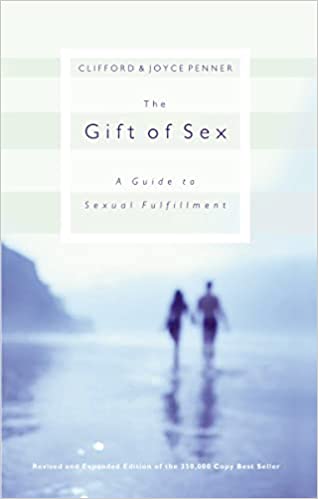
The Gift of Sex: A Guide to Sexual Fulfillment – Clifford and Joyce Penner
The Heart and Soul of Sex – Gina Ogden In The Heart and Soul of Sex, Ogden coaches readers to fully realize the physical, emotional, mental, and spiritual aspects of sex.
Passionate Marriage – David Schnarch
Passionate Marriage has long been recognized as the pioneering book on intimate human relationships. This book explores the ways we can keep passion alive and even reach the height of sexual and emotional fulfillment later in life. This book provides the scaffolding for overcoming sexual and emotional problems. It seeks to help couples invigorate their relationships and reach the fullest potential in their love lives.
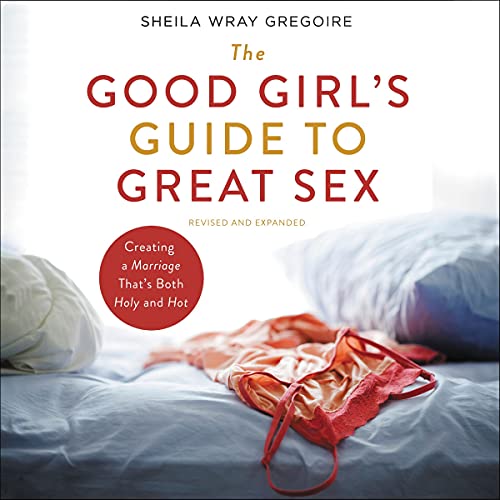
The Good Girl’s Guide to Great Sex – Sheila Gregoire
Online Courses, Conferences, Workshops, and Other Resources
Most recommended:
Sex Ed 101 – With Kat Harris and Sexologist Dr. Celeste Holbrook
Orgasm or Libido Courses – Sheila Gregoire Online Courses
The Sexual Attachment Conference – Jay Stringer and Adam Young (Host of The Place We Find Ourselves Podcast)
Other Mentions
Master Class with Emily Morse – Emily Morse (Sex with Emily Podcast)
SexEd Reclaimed – Honest courses for kids 3-18, Researched material, Faith focus
Embodied Sexuality Course – Therapist Jenny McGrath
Christian Sexuality – Curated by Preston Sprinkle
Low Sex Drive Coaching – Dr. Celeste Holbrook
Sex Ed 101 with Kat Harris and Dr Celeste Holbrook – Podcast
Comprehensive Sexuality Education for Private Groups – Lauren Elise | Sex Ed For You
Dating Done Right – Book by Crystal Renaud Day
Intimately Us – The only app I received recommendations for. Designed for marriages.
Permission for Pleasure Podcast– Cindy Scharkey – Health care professional leading educational conversations about sexual health
Who People Are Following on Instagram
Sheila Gregoire -Christian marriage & sex blogger & podcaster, author of The Great Sex Rescue. Changing the evangelical convo about sex.
The Christian Sex Educator – Carlie Palmer Webb, MS
Authentic Intimacy | Juli Slattery– Reclaiming God’s design for sexuality | Passionate about #RethinkingSexuality. Authentic Intimacy also have groups being offered this fall with a trained facilitator. https://www.authenticintimacy.com/online-book-studies
Kat Harris Coach / Author / Sexless in the City |Podcast @therefinedcollective | Discovering God in the Grey
Preston Sprinkle – President of The Center for Faith, Sexuality & Gender.
SexEd Reclaimed – Honest courses for kids 3-18, Researched material, Faith focus
Sex Ed For You Lauren Elise: Comprehensive sexuality education and curricula for individuals, couples, and parents
Meg – Sex and Relationship Coach – Also offers The Shame Free Sex Course (comprehensive sex ed, reclaiming agency, partnered communication, origins of purity culture, etc.)
Big Kids’ Table – Faith Sex Ed
Dr Celeste Holbrook – A s3x educator helping you find more connection and pleasure.
Deconstruction and Reconstruction
We’re in a period of time where there is a great deal of deconstruction surrounding the Christian sexual ethic. I am so grateful for the deconstruction of idolatrous and harmful systems like purity culture. The courage of people willing to name the abuses and trauma they experienced within these systems is inspiring and necessary to the health and witness of the church. Let’s keep going.
The inevitable question after deconstruction is: How do I rebuild?
The biggest issue at play with reconstruction is trust. If trusting a religious system led to harm, the natural response is to form an inner vow to never trust to that degree again. In this way, every vow has a measure of wisdom to it. But vows can also be a curse against the part of our hearts that sought connection and trusted in something larger than ourselves. The tragedy of self-protection is that it can unwittingly condemn the part of ourselves that desires and needs attachment.
Reconstruction is most commonly stalled by cynicism and the belief that the self knows exactly what is best.
Although it might surprise you to hear this, the high school years I mentioned on the podcast were some of the best years of my life. As I’ve deconstructed my purity culture years, what I’ve not been able to split off is my gratitude for the relationships and how deeply I desired to honor God during that season. At my 20th high school reunion, I reconnected with several friends and while we all acknowledged the theological harm we underwent, we could not escape how grateful we were for one another. In purity culture, I also met friends who wanted to follow the way of Jesus, deeply enjoy one another, and bring meaning and beauty into the world.
Ambivalence, which means pulled in two directions, is a central feature of reconstruction. On one hand I want to trust in leaders and systems again, on the other hand I never want to be fooled again. While my vulnerability led me into the harms of purity culture it also led me into friendship with God and others. What then am I to do with my vulnerability? Should I let purity culture turn one of the most beautiful dimensions of my heart to cynicism? Hell no. It has already taken too much ground. Instead, the greatest defeat of purity culture is to surrender once again to deep connection with God and others, but this time with a strong sense of defiance against any system that demands dogmatic compliance.
The mark of mature reconstruction is learning to stand against harmful systems that deepen and leverage shame while simultaneously blessing the part of our hearts that deeply want to honor God, enjoy others, and be spiritually formed. Reconstruction requires defiance against harm, but also a vulnerable passion to grow in connection with others.
I know many people who stand against harm, but remain isolated. I know many people who remain connected with others, but naive to harm all around them. While rare, I know a handful of men and women who will raise heaven against hellish systems of harm and paradoxically, remain deeply committed to love. The way I see it is we must choose between cynicism, naïveté, or love.
One thing I am seeing more and more is people saying they have “lost faith” or are now “ex-faith.” While I understand what they are saying, the reality is every one of us has faith, which is another word for trust. You may no longer trust in a denomination or a pastor, or God, but you still have faith in someone or something. No one can live without faith. Deconstruction is the courageous interrogation of trust. Yet as soon as we deconstruct the ground beneath us, we instinctively look for another source of stability. For some this is the first time they learn to trust in the wisdom of their body and to listen to what their soul has been trying to tell them. While I am grateful for learning to trust one’s self, it’s never complete because we also need to learn and be formed through tradition and community. Therefore, I want to offer three additional ways to pursue reconstruction:
1. Pursue Beauty
Theology has historically been concerned with the true, the good, and the beautiful (borrowing from Platonic ideals). When those three descriptors were first mentioned however, the order was reversed: Beauty, Goodness, and Truth. What this means is that we can most reliably get to truth through immersing ourselves in beauty and goodness. Too often, church leaders have attempted to push us to TRUTH, without ever inviting us to consider what brings beauty and goodness into our lives.
As you pursue sexual health in your adult life, think about experiences you’ve had where you felt beauty, power, or deep connection with your body or your partner. It’s important to note that beauty and connection do not have to be sexual or orgasmic. Maybe it was the last time you paddle boarded, hiked up a mountain, or took a long, luxurious bath.
When and where was the last time you felt the beauty of your body with delight? What might this experiencing be showing you about how to connect to your sensuality?
2. Pursue The Bible’s Vision of Flourishing
Hear me out. I know whenever I’m told to read the Bible, I’m brought back to my childhood Sunday School teacher who had us sing, “Read your Bible, pray every day and you’ll grow, grow, grow!” and several baptist teachers who came into my high school using the Bible to influence, if not clobber us into feeling guilty for sexual thoughts and behaviors as adolescents.
The reality however is that the Bible is one of the most sex-positive works ever written. As you read it, you get the sense that there is no awkwardness when it comes to sexual arousal or sexual content; that belongs to church history. The Scriptures cast a pictures of a flourishing world: men and women as co-image bearers that reveal the character and likeness of God, couples emotionally and sexually delighting in one another, and humanity cultivating the good world God has created for them.
Through the Bible, we learn that God is the author and designer of all the things our hearts love. Whether sexual pleasure, covenantal love, or the best wine at a wedding, God is the creator of the best things in life and we are invited to join with God in cultivating them. God created our sexual organs with thousands of nerve endings (the penis has over 4,000 and the clitoris has over 8,000!) and shows us that the only way to truly know someone is not through using them for temporary gain, but through committing your lives to one another. Whereas modern society sees sex as naked bodies, the Bible’s understanding is where couples are naked emotionally, spiritually, legally, and spiritually. Contrary to popular belief, you can never become too sexual for God. Sex a gift to be enjoyed and a window into the heart of God for us.
3. Pursue Community
The critique I have for the “self knows best” mentality in the modern world is not so much that we will be led astray in our deceit, but that we have so much to learn from the expertise and experiences of others. Many years ago Amnesty International attempted to offer free individual therapy to trauma survivors. The project had mixed results, but in the process they learned group therapy was more effective than individual therapy for this population. The reason was that trauma survivors benefitted much more from hearing other victims put language to their experiences and feelings. We need others to understand the path to healing and growth.
The woman who asked for adult sex ed resources that I mentioned at the beginning of this post is a great example of what it means to pursue growth and truth in community. She knew that the education she received was not adequate and harmful (deconstruction) and that the most effective learning would be done through a community seeking to discover beauty and wholeness (reconstruction). May we all be so courageous to deconstruct and to reconstruct with such wisdom.
What’s Next?
In Brene Brown’s latest book, Atlas of the Heart, she quotes Ludwig Wittgenstein who says, “The limits of my language mean the limits of my world.” One of the greatest gifts you can give yourself as an adult to to increase your language and knowledge of sexual health and your sexual story. In this way, you begin to give yourself the resources you needed as a child and adolescent. It’s never too late to begin this process.
Who are two or three friends you could invite to join you in going through the resources mentioned above?
Sexual pleasure is one of the greatest gifts God has given to us. Let’s do our part to discover and cultivate it.



